Developing Competency-Based Clinical Evaluation Tool for Nurses
VerifiedAdded on 2023/06/03
|6
|2057
|292
Case Study
AI Summary
This case study examines the development of a Midwifery Competency Assessment Tool (MCAT) and argues for and against the development of such tools in professional nursing education. It analyzes the tool's effectiveness through Brenner’s Novice-to-Expert theory and includes a personal reflection on clinical reasoning, teamwork, problem-solving, research, and communication using Rolfe’s model. The study highlights the importance of competency-based education in meeting the growing demands for professional nurses, addressing challenges in self-assessment, and emphasizing the need for skill gap analysis to facilitate the progression of nurses from novice to expert levels. The reflection underscores the importance of teamwork, communication, and continuous research in clinical practice, while identifying strengths and areas for improvement in professional nursing standards.
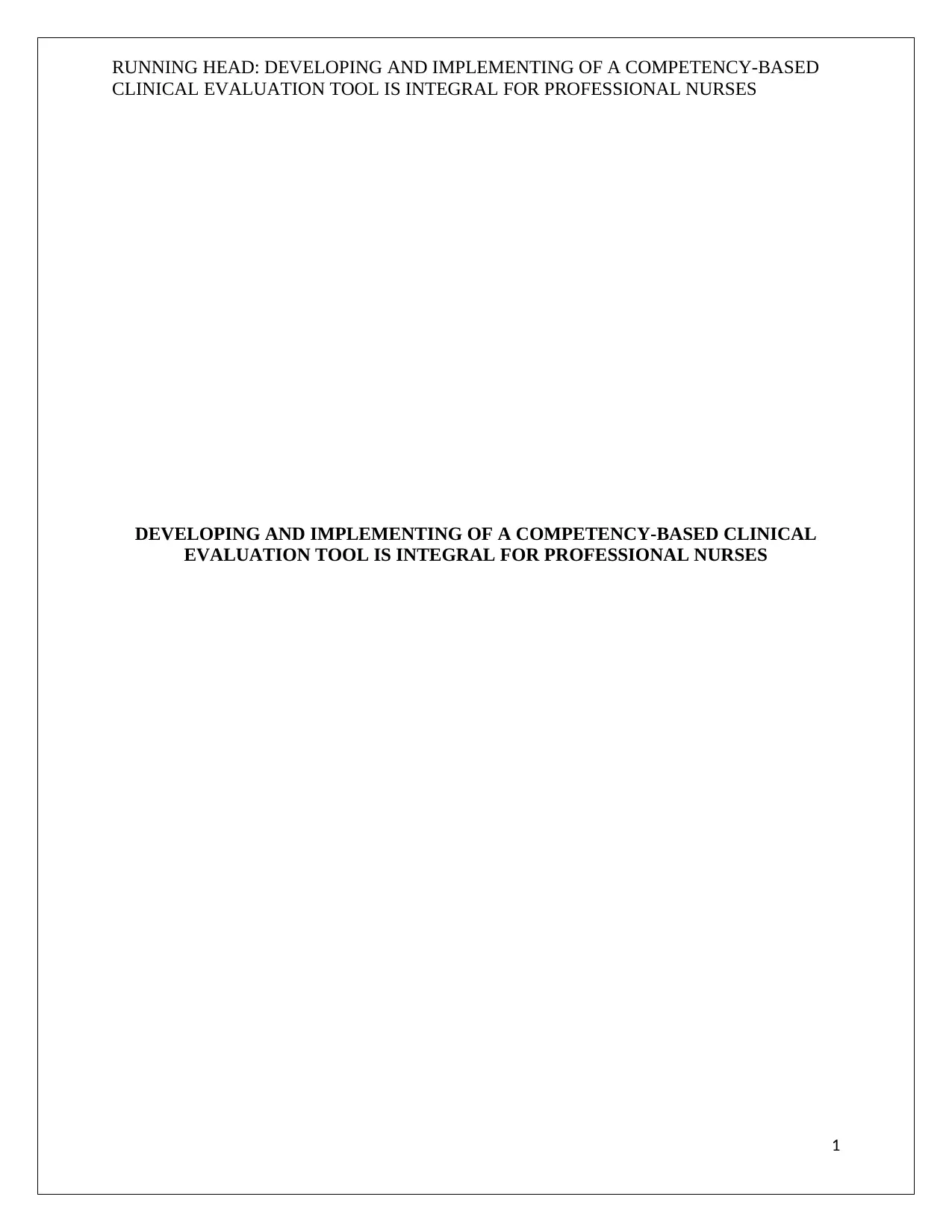
RUNNING HEAD: DEVELOPING AND IMPLEMENTING OF A COMPETENCY-BASED
CLINICAL EVALUATION TOOL IS INTEGRAL FOR PROFESSIONAL NURSES
DEVELOPING AND IMPLEMENTING OF A COMPETENCY-BASED CLINICAL
EVALUATION TOOL IS INTEGRAL FOR PROFESSIONAL NURSES
1
CLINICAL EVALUATION TOOL IS INTEGRAL FOR PROFESSIONAL NURSES
DEVELOPING AND IMPLEMENTING OF A COMPETENCY-BASED CLINICAL
EVALUATION TOOL IS INTEGRAL FOR PROFESSIONAL NURSES
1
Paraphrase This Document
Need a fresh take? Get an instant paraphrase of this document with our AI Paraphraser
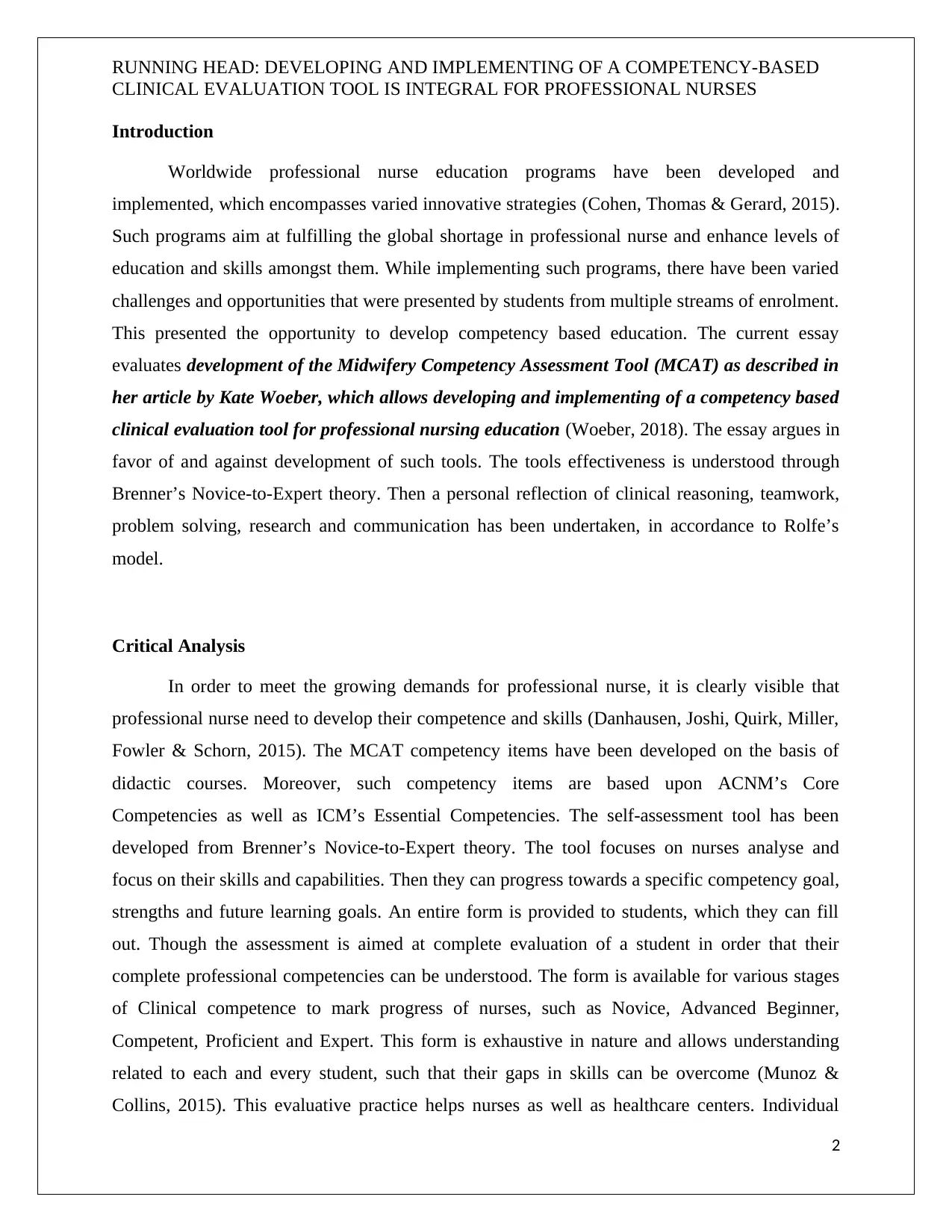
RUNNING HEAD: DEVELOPING AND IMPLEMENTING OF A COMPETENCY-BASED
CLINICAL EVALUATION TOOL IS INTEGRAL FOR PROFESSIONAL NURSES
Introduction
Worldwide professional nurse education programs have been developed and
implemented, which encompasses varied innovative strategies (Cohen, Thomas & Gerard, 2015).
Such programs aim at fulfilling the global shortage in professional nurse and enhance levels of
education and skills amongst them. While implementing such programs, there have been varied
challenges and opportunities that were presented by students from multiple streams of enrolment.
This presented the opportunity to develop competency based education. The current essay
evaluates development of the Midwifery Competency Assessment Tool (MCAT) as described in
her article by Kate Woeber, which allows developing and implementing of a competency based
clinical evaluation tool for professional nursing education (Woeber, 2018). The essay argues in
favor of and against development of such tools. The tools effectiveness is understood through
Brenner’s Novice-to-Expert theory. Then a personal reflection of clinical reasoning, teamwork,
problem solving, research and communication has been undertaken, in accordance to Rolfe’s
model.
Critical Analysis
In order to meet the growing demands for professional nurse, it is clearly visible that
professional nurse need to develop their competence and skills (Danhausen, Joshi, Quirk, Miller,
Fowler & Schorn, 2015). The MCAT competency items have been developed on the basis of
didactic courses. Moreover, such competency items are based upon ACNM’s Core
Competencies as well as ICM’s Essential Competencies. The self-assessment tool has been
developed from Brenner’s Novice-to-Expert theory. The tool focuses on nurses analyse and
focus on their skills and capabilities. Then they can progress towards a specific competency goal,
strengths and future learning goals. An entire form is provided to students, which they can fill
out. Though the assessment is aimed at complete evaluation of a student in order that their
complete professional competencies can be understood. The form is available for various stages
of Clinical competence to mark progress of nurses, such as Novice, Advanced Beginner,
Competent, Proficient and Expert. This form is exhaustive in nature and allows understanding
related to each and every student, such that their gaps in skills can be overcome (Munoz &
Collins, 2015). This evaluative practice helps nurses as well as healthcare centers. Individual
2
CLINICAL EVALUATION TOOL IS INTEGRAL FOR PROFESSIONAL NURSES
Introduction
Worldwide professional nurse education programs have been developed and
implemented, which encompasses varied innovative strategies (Cohen, Thomas & Gerard, 2015).
Such programs aim at fulfilling the global shortage in professional nurse and enhance levels of
education and skills amongst them. While implementing such programs, there have been varied
challenges and opportunities that were presented by students from multiple streams of enrolment.
This presented the opportunity to develop competency based education. The current essay
evaluates development of the Midwifery Competency Assessment Tool (MCAT) as described in
her article by Kate Woeber, which allows developing and implementing of a competency based
clinical evaluation tool for professional nursing education (Woeber, 2018). The essay argues in
favor of and against development of such tools. The tools effectiveness is understood through
Brenner’s Novice-to-Expert theory. Then a personal reflection of clinical reasoning, teamwork,
problem solving, research and communication has been undertaken, in accordance to Rolfe’s
model.
Critical Analysis
In order to meet the growing demands for professional nurse, it is clearly visible that
professional nurse need to develop their competence and skills (Danhausen, Joshi, Quirk, Miller,
Fowler & Schorn, 2015). The MCAT competency items have been developed on the basis of
didactic courses. Moreover, such competency items are based upon ACNM’s Core
Competencies as well as ICM’s Essential Competencies. The self-assessment tool has been
developed from Brenner’s Novice-to-Expert theory. The tool focuses on nurses analyse and
focus on their skills and capabilities. Then they can progress towards a specific competency goal,
strengths and future learning goals. An entire form is provided to students, which they can fill
out. Though the assessment is aimed at complete evaluation of a student in order that their
complete professional competencies can be understood. The form is available for various stages
of Clinical competence to mark progress of nurses, such as Novice, Advanced Beginner,
Competent, Proficient and Expert. This form is exhaustive in nature and allows understanding
related to each and every student, such that their gaps in skills can be overcome (Munoz &
Collins, 2015). This evaluative practice helps nurses as well as healthcare centers. Individual
2
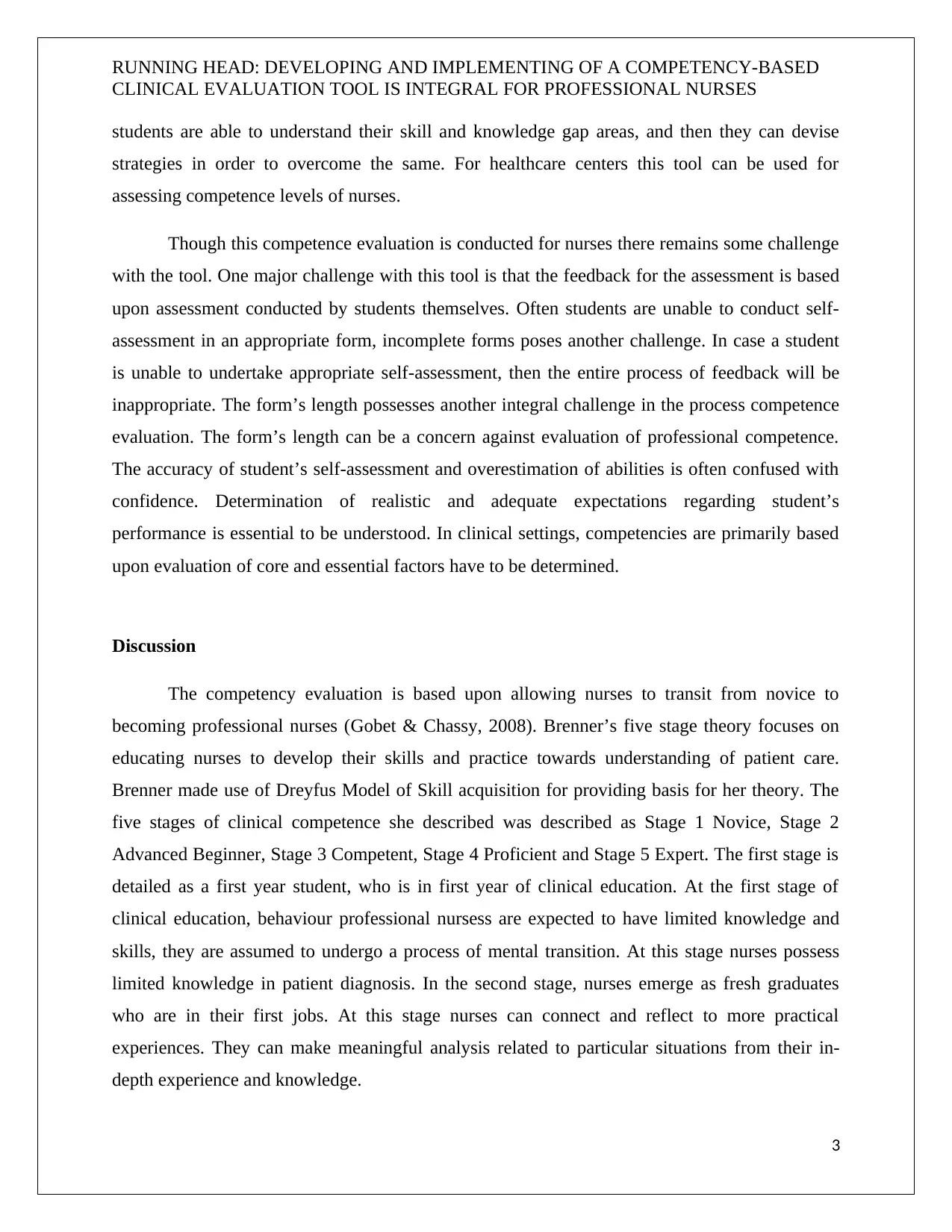
RUNNING HEAD: DEVELOPING AND IMPLEMENTING OF A COMPETENCY-BASED
CLINICAL EVALUATION TOOL IS INTEGRAL FOR PROFESSIONAL NURSES
students are able to understand their skill and knowledge gap areas, and then they can devise
strategies in order to overcome the same. For healthcare centers this tool can be used for
assessing competence levels of nurses.
Though this competence evaluation is conducted for nurses there remains some challenge
with the tool. One major challenge with this tool is that the feedback for the assessment is based
upon assessment conducted by students themselves. Often students are unable to conduct self-
assessment in an appropriate form, incomplete forms poses another challenge. In case a student
is unable to undertake appropriate self-assessment, then the entire process of feedback will be
inappropriate. The form’s length possesses another integral challenge in the process competence
evaluation. The form’s length can be a concern against evaluation of professional competence.
The accuracy of student’s self-assessment and overestimation of abilities is often confused with
confidence. Determination of realistic and adequate expectations regarding student’s
performance is essential to be understood. In clinical settings, competencies are primarily based
upon evaluation of core and essential factors have to be determined.
Discussion
The competency evaluation is based upon allowing nurses to transit from novice to
becoming professional nurses (Gobet & Chassy, 2008). Brenner’s five stage theory focuses on
educating nurses to develop their skills and practice towards understanding of patient care.
Brenner made use of Dreyfus Model of Skill acquisition for providing basis for her theory. The
five stages of clinical competence she described was described as Stage 1 Novice, Stage 2
Advanced Beginner, Stage 3 Competent, Stage 4 Proficient and Stage 5 Expert. The first stage is
detailed as a first year student, who is in first year of clinical education. At the first stage of
clinical education, behaviour professional nursess are expected to have limited knowledge and
skills, they are assumed to undergo a process of mental transition. At this stage nurses possess
limited knowledge in patient diagnosis. In the second stage, nurses emerge as fresh graduates
who are in their first jobs. At this stage nurses can connect and reflect to more practical
experiences. They can make meaningful analysis related to particular situations from their in-
depth experience and knowledge.
3
CLINICAL EVALUATION TOOL IS INTEGRAL FOR PROFESSIONAL NURSES
students are able to understand their skill and knowledge gap areas, and then they can devise
strategies in order to overcome the same. For healthcare centers this tool can be used for
assessing competence levels of nurses.
Though this competence evaluation is conducted for nurses there remains some challenge
with the tool. One major challenge with this tool is that the feedback for the assessment is based
upon assessment conducted by students themselves. Often students are unable to conduct self-
assessment in an appropriate form, incomplete forms poses another challenge. In case a student
is unable to undertake appropriate self-assessment, then the entire process of feedback will be
inappropriate. The form’s length possesses another integral challenge in the process competence
evaluation. The form’s length can be a concern against evaluation of professional competence.
The accuracy of student’s self-assessment and overestimation of abilities is often confused with
confidence. Determination of realistic and adequate expectations regarding student’s
performance is essential to be understood. In clinical settings, competencies are primarily based
upon evaluation of core and essential factors have to be determined.
Discussion
The competency evaluation is based upon allowing nurses to transit from novice to
becoming professional nurses (Gobet & Chassy, 2008). Brenner’s five stage theory focuses on
educating nurses to develop their skills and practice towards understanding of patient care.
Brenner made use of Dreyfus Model of Skill acquisition for providing basis for her theory. The
five stages of clinical competence she described was described as Stage 1 Novice, Stage 2
Advanced Beginner, Stage 3 Competent, Stage 4 Proficient and Stage 5 Expert. The first stage is
detailed as a first year student, who is in first year of clinical education. At the first stage of
clinical education, behaviour professional nursess are expected to have limited knowledge and
skills, they are assumed to undergo a process of mental transition. At this stage nurses possess
limited knowledge in patient diagnosis. In the second stage, nurses emerge as fresh graduates
who are in their first jobs. At this stage nurses can connect and reflect to more practical
experiences. They can make meaningful analysis related to particular situations from their in-
depth experience and knowledge.
3
⊘ This is a preview!⊘
Do you want full access?
Subscribe today to unlock all pages.

Trusted by 1+ million students worldwide
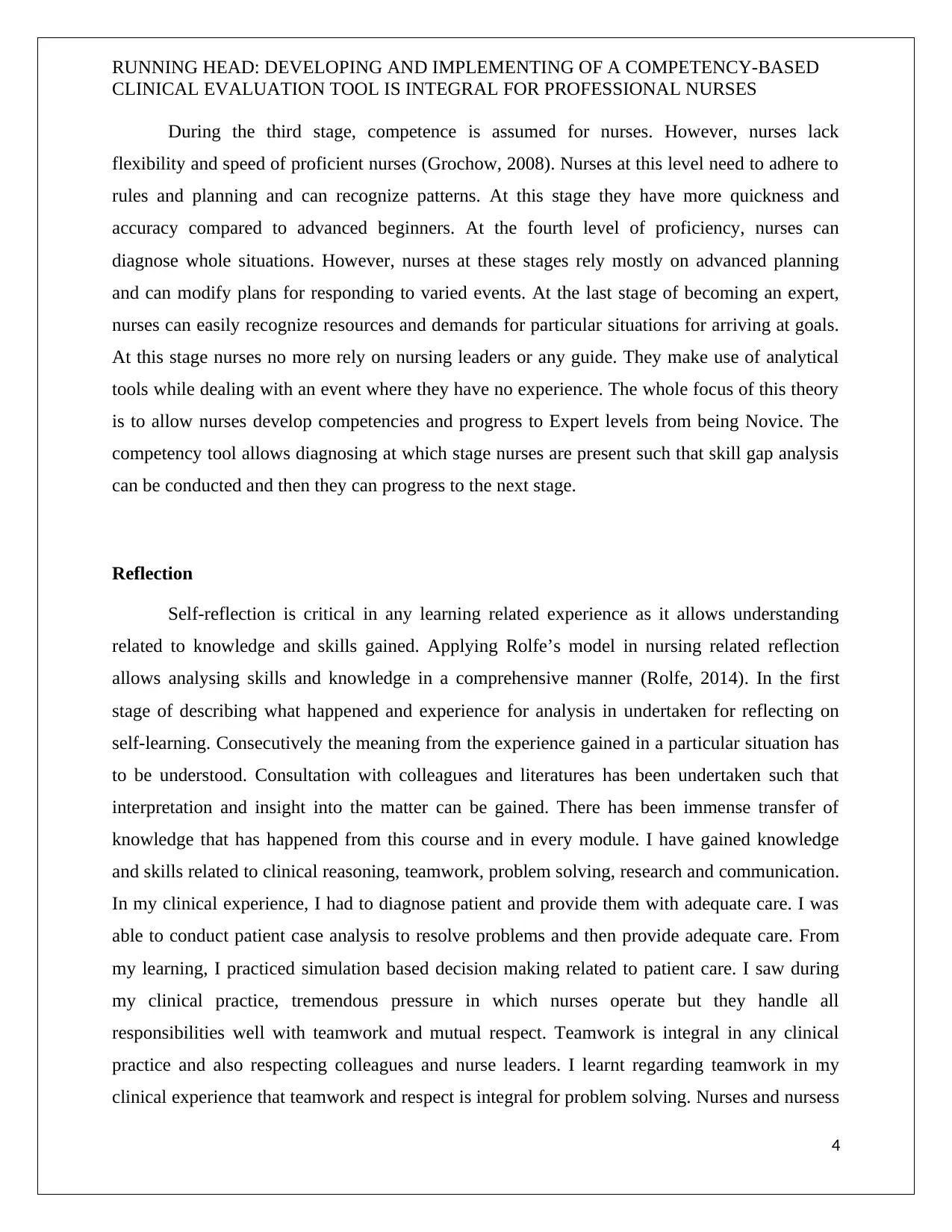
RUNNING HEAD: DEVELOPING AND IMPLEMENTING OF A COMPETENCY-BASED
CLINICAL EVALUATION TOOL IS INTEGRAL FOR PROFESSIONAL NURSES
During the third stage, competence is assumed for nurses. However, nurses lack
flexibility and speed of proficient nurses (Grochow, 2008). Nurses at this level need to adhere to
rules and planning and can recognize patterns. At this stage they have more quickness and
accuracy compared to advanced beginners. At the fourth level of proficiency, nurses can
diagnose whole situations. However, nurses at these stages rely mostly on advanced planning
and can modify plans for responding to varied events. At the last stage of becoming an expert,
nurses can easily recognize resources and demands for particular situations for arriving at goals.
At this stage nurses no more rely on nursing leaders or any guide. They make use of analytical
tools while dealing with an event where they have no experience. The whole focus of this theory
is to allow nurses develop competencies and progress to Expert levels from being Novice. The
competency tool allows diagnosing at which stage nurses are present such that skill gap analysis
can be conducted and then they can progress to the next stage.
Reflection
Self-reflection is critical in any learning related experience as it allows understanding
related to knowledge and skills gained. Applying Rolfe’s model in nursing related reflection
allows analysing skills and knowledge in a comprehensive manner (Rolfe, 2014). In the first
stage of describing what happened and experience for analysis in undertaken for reflecting on
self-learning. Consecutively the meaning from the experience gained in a particular situation has
to be understood. Consultation with colleagues and literatures has been undertaken such that
interpretation and insight into the matter can be gained. There has been immense transfer of
knowledge that has happened from this course and in every module. I have gained knowledge
and skills related to clinical reasoning, teamwork, problem solving, research and communication.
In my clinical experience, I had to diagnose patient and provide them with adequate care. I was
able to conduct patient case analysis to resolve problems and then provide adequate care. From
my learning, I practiced simulation based decision making related to patient care. I saw during
my clinical practice, tremendous pressure in which nurses operate but they handle all
responsibilities well with teamwork and mutual respect. Teamwork is integral in any clinical
practice and also respecting colleagues and nurse leaders. I learnt regarding teamwork in my
clinical experience that teamwork and respect is integral for problem solving. Nurses and nursess
4
CLINICAL EVALUATION TOOL IS INTEGRAL FOR PROFESSIONAL NURSES
During the third stage, competence is assumed for nurses. However, nurses lack
flexibility and speed of proficient nurses (Grochow, 2008). Nurses at this level need to adhere to
rules and planning and can recognize patterns. At this stage they have more quickness and
accuracy compared to advanced beginners. At the fourth level of proficiency, nurses can
diagnose whole situations. However, nurses at these stages rely mostly on advanced planning
and can modify plans for responding to varied events. At the last stage of becoming an expert,
nurses can easily recognize resources and demands for particular situations for arriving at goals.
At this stage nurses no more rely on nursing leaders or any guide. They make use of analytical
tools while dealing with an event where they have no experience. The whole focus of this theory
is to allow nurses develop competencies and progress to Expert levels from being Novice. The
competency tool allows diagnosing at which stage nurses are present such that skill gap analysis
can be conducted and then they can progress to the next stage.
Reflection
Self-reflection is critical in any learning related experience as it allows understanding
related to knowledge and skills gained. Applying Rolfe’s model in nursing related reflection
allows analysing skills and knowledge in a comprehensive manner (Rolfe, 2014). In the first
stage of describing what happened and experience for analysis in undertaken for reflecting on
self-learning. Consecutively the meaning from the experience gained in a particular situation has
to be understood. Consultation with colleagues and literatures has been undertaken such that
interpretation and insight into the matter can be gained. There has been immense transfer of
knowledge that has happened from this course and in every module. I have gained knowledge
and skills related to clinical reasoning, teamwork, problem solving, research and communication.
In my clinical experience, I had to diagnose patient and provide them with adequate care. I was
able to conduct patient case analysis to resolve problems and then provide adequate care. From
my learning, I practiced simulation based decision making related to patient care. I saw during
my clinical practice, tremendous pressure in which nurses operate but they handle all
responsibilities well with teamwork and mutual respect. Teamwork is integral in any clinical
practice and also respecting colleagues and nurse leaders. I learnt regarding teamwork in my
clinical experience that teamwork and respect is integral for problem solving. Nurses and nursess
4
Paraphrase This Document
Need a fresh take? Get an instant paraphrase of this document with our AI Paraphraser
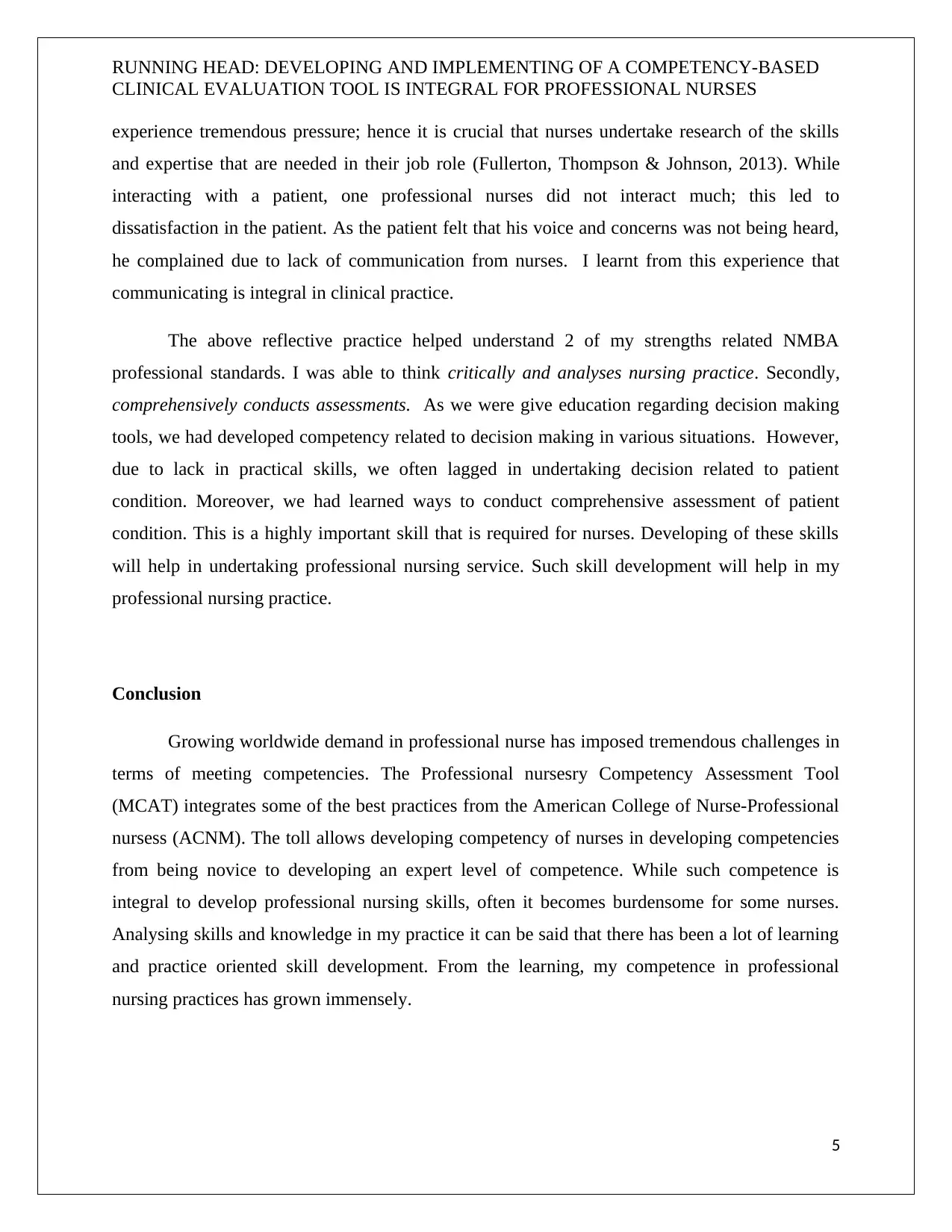
RUNNING HEAD: DEVELOPING AND IMPLEMENTING OF A COMPETENCY-BASED
CLINICAL EVALUATION TOOL IS INTEGRAL FOR PROFESSIONAL NURSES
experience tremendous pressure; hence it is crucial that nurses undertake research of the skills
and expertise that are needed in their job role (Fullerton, Thompson & Johnson, 2013). While
interacting with a patient, one professional nurses did not interact much; this led to
dissatisfaction in the patient. As the patient felt that his voice and concerns was not being heard,
he complained due to lack of communication from nurses. I learnt from this experience that
communicating is integral in clinical practice.
The above reflective practice helped understand 2 of my strengths related NMBA
professional standards. I was able to think critically and analyses nursing practice. Secondly,
comprehensively conducts assessments. As we were give education regarding decision making
tools, we had developed competency related to decision making in various situations. However,
due to lack in practical skills, we often lagged in undertaking decision related to patient
condition. Moreover, we had learned ways to conduct comprehensive assessment of patient
condition. This is a highly important skill that is required for nurses. Developing of these skills
will help in undertaking professional nursing service. Such skill development will help in my
professional nursing practice.
Conclusion
Growing worldwide demand in professional nurse has imposed tremendous challenges in
terms of meeting competencies. The Professional nursesry Competency Assessment Tool
(MCAT) integrates some of the best practices from the American College of Nurse-Professional
nursess (ACNM). The toll allows developing competency of nurses in developing competencies
from being novice to developing an expert level of competence. While such competence is
integral to develop professional nursing skills, often it becomes burdensome for some nurses.
Analysing skills and knowledge in my practice it can be said that there has been a lot of learning
and practice oriented skill development. From the learning, my competence in professional
nursing practices has grown immensely.
5
CLINICAL EVALUATION TOOL IS INTEGRAL FOR PROFESSIONAL NURSES
experience tremendous pressure; hence it is crucial that nurses undertake research of the skills
and expertise that are needed in their job role (Fullerton, Thompson & Johnson, 2013). While
interacting with a patient, one professional nurses did not interact much; this led to
dissatisfaction in the patient. As the patient felt that his voice and concerns was not being heard,
he complained due to lack of communication from nurses. I learnt from this experience that
communicating is integral in clinical practice.
The above reflective practice helped understand 2 of my strengths related NMBA
professional standards. I was able to think critically and analyses nursing practice. Secondly,
comprehensively conducts assessments. As we were give education regarding decision making
tools, we had developed competency related to decision making in various situations. However,
due to lack in practical skills, we often lagged in undertaking decision related to patient
condition. Moreover, we had learned ways to conduct comprehensive assessment of patient
condition. This is a highly important skill that is required for nurses. Developing of these skills
will help in undertaking professional nursing service. Such skill development will help in my
professional nursing practice.
Conclusion
Growing worldwide demand in professional nurse has imposed tremendous challenges in
terms of meeting competencies. The Professional nursesry Competency Assessment Tool
(MCAT) integrates some of the best practices from the American College of Nurse-Professional
nursess (ACNM). The toll allows developing competency of nurses in developing competencies
from being novice to developing an expert level of competence. While such competence is
integral to develop professional nursing skills, often it becomes burdensome for some nurses.
Analysing skills and knowledge in my practice it can be said that there has been a lot of learning
and practice oriented skill development. From the learning, my competence in professional
nursing practices has grown immensely.
5
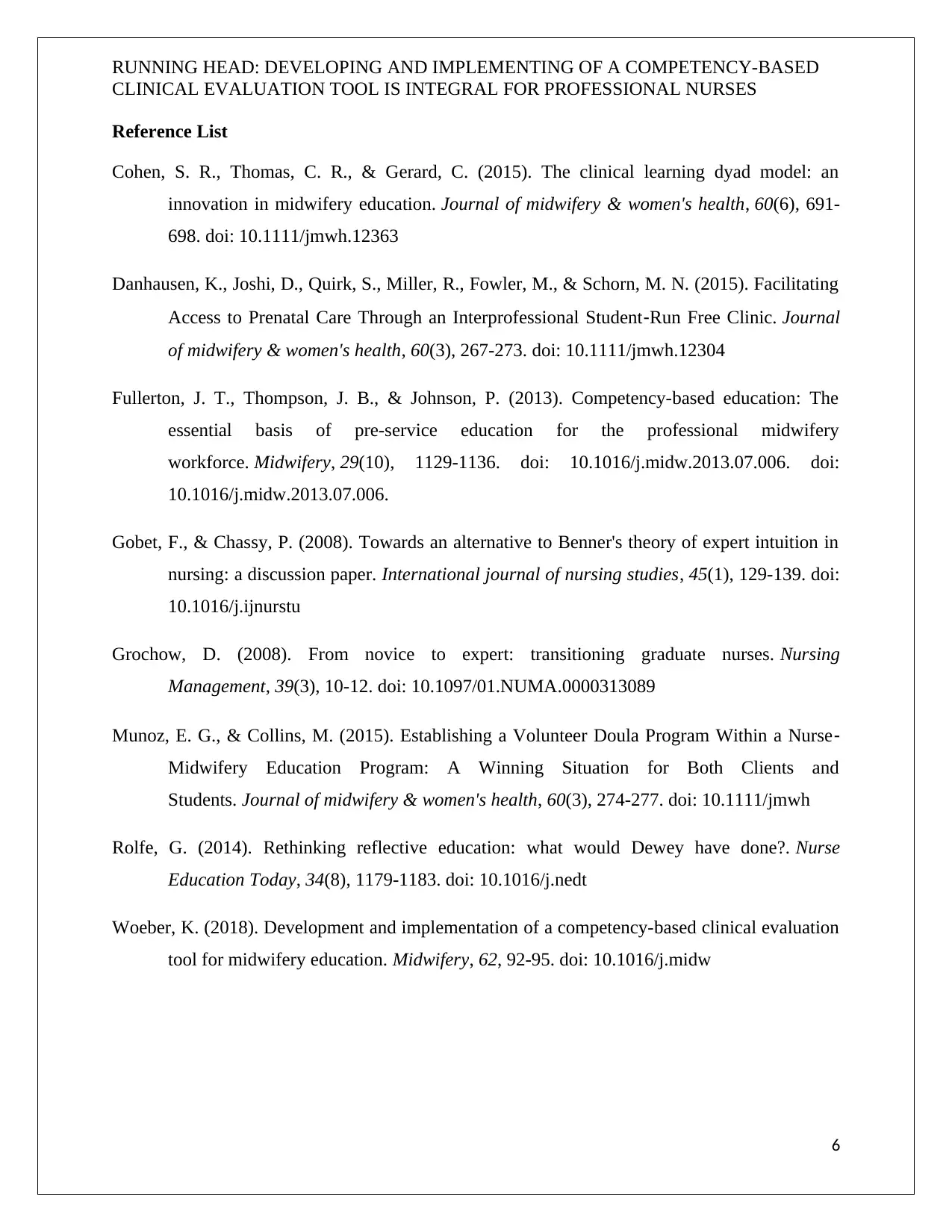
RUNNING HEAD: DEVELOPING AND IMPLEMENTING OF A COMPETENCY-BASED
CLINICAL EVALUATION TOOL IS INTEGRAL FOR PROFESSIONAL NURSES
Reference List
Cohen, S. R., Thomas, C. R., & Gerard, C. (2015). The clinical learning dyad model: an
innovation in midwifery education. Journal of midwifery & women's health, 60(6), 691-
698. doi: 10.1111/jmwh.12363
Danhausen, K., Joshi, D., Quirk, S., Miller, R., Fowler, M., & Schorn, M. N. (2015). Facilitating
Access to Prenatal Care Through an Interprofessional Student‐Run Free Clinic. Journal
of midwifery & women's health, 60(3), 267-273. doi: 10.1111/jmwh.12304
Fullerton, J. T., Thompson, J. B., & Johnson, P. (2013). Competency-based education: The
essential basis of pre-service education for the professional midwifery
workforce. Midwifery, 29(10), 1129-1136. doi: 10.1016/j.midw.2013.07.006. doi:
10.1016/j.midw.2013.07.006.
Gobet, F., & Chassy, P. (2008). Towards an alternative to Benner's theory of expert intuition in
nursing: a discussion paper. International journal of nursing studies, 45(1), 129-139. doi:
10.1016/j.ijnurstu
Grochow, D. (2008). From novice to expert: transitioning graduate nurses. Nursing
Management, 39(3), 10-12. doi: 10.1097/01.NUMA.0000313089
Munoz, E. G., & Collins, M. (2015). Establishing a Volunteer Doula Program Within a Nurse‐
Midwifery Education Program: A Winning Situation for Both Clients and
Students. Journal of midwifery & women's health, 60(3), 274-277. doi: 10.1111/jmwh
Rolfe, G. (2014). Rethinking reflective education: what would Dewey have done?. Nurse
Education Today, 34(8), 1179-1183. doi: 10.1016/j.nedt
Woeber, K. (2018). Development and implementation of a competency-based clinical evaluation
tool for midwifery education. Midwifery, 62, 92-95. doi: 10.1016/j.midw
6
CLINICAL EVALUATION TOOL IS INTEGRAL FOR PROFESSIONAL NURSES
Reference List
Cohen, S. R., Thomas, C. R., & Gerard, C. (2015). The clinical learning dyad model: an
innovation in midwifery education. Journal of midwifery & women's health, 60(6), 691-
698. doi: 10.1111/jmwh.12363
Danhausen, K., Joshi, D., Quirk, S., Miller, R., Fowler, M., & Schorn, M. N. (2015). Facilitating
Access to Prenatal Care Through an Interprofessional Student‐Run Free Clinic. Journal
of midwifery & women's health, 60(3), 267-273. doi: 10.1111/jmwh.12304
Fullerton, J. T., Thompson, J. B., & Johnson, P. (2013). Competency-based education: The
essential basis of pre-service education for the professional midwifery
workforce. Midwifery, 29(10), 1129-1136. doi: 10.1016/j.midw.2013.07.006. doi:
10.1016/j.midw.2013.07.006.
Gobet, F., & Chassy, P. (2008). Towards an alternative to Benner's theory of expert intuition in
nursing: a discussion paper. International journal of nursing studies, 45(1), 129-139. doi:
10.1016/j.ijnurstu
Grochow, D. (2008). From novice to expert: transitioning graduate nurses. Nursing
Management, 39(3), 10-12. doi: 10.1097/01.NUMA.0000313089
Munoz, E. G., & Collins, M. (2015). Establishing a Volunteer Doula Program Within a Nurse‐
Midwifery Education Program: A Winning Situation for Both Clients and
Students. Journal of midwifery & women's health, 60(3), 274-277. doi: 10.1111/jmwh
Rolfe, G. (2014). Rethinking reflective education: what would Dewey have done?. Nurse
Education Today, 34(8), 1179-1183. doi: 10.1016/j.nedt
Woeber, K. (2018). Development and implementation of a competency-based clinical evaluation
tool for midwifery education. Midwifery, 62, 92-95. doi: 10.1016/j.midw
6
⊘ This is a preview!⊘
Do you want full access?
Subscribe today to unlock all pages.

Trusted by 1+ million students worldwide
1 out of 6
Related Documents
Your All-in-One AI-Powered Toolkit for Academic Success.
+13062052269
info@desklib.com
Available 24*7 on WhatsApp / Email
![[object Object]](/_next/static/media/star-bottom.7253800d.svg)
Unlock your academic potential
Copyright © 2020–2026 A2Z Services. All Rights Reserved. Developed and managed by ZUCOL.





